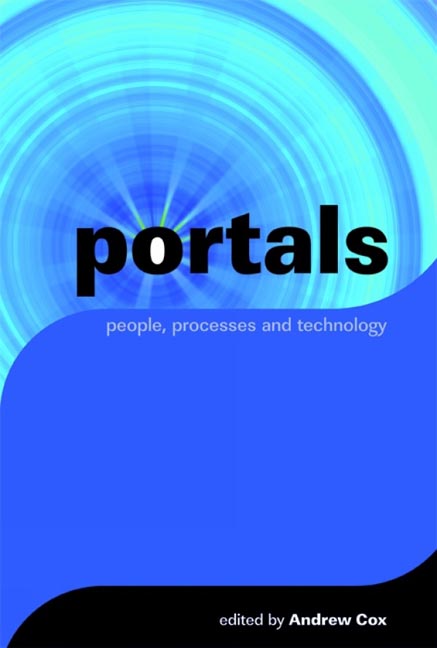Section 5 - The future
Published online by Cambridge University Press: 09 June 2018
Summary
The assiduous reader of the previous chapters will already have gathered many notes about the future(s) of the portal. To pick out a few points: Franklin specified some next steps within the possibilities of the emerging technology. Winship reviewed the vast array of functions and services appearing in web portals, all candidates to be the killer application that sells a new organizational portal to users. Hepworth, Probets, Qutaishat and Walton pondered the possibilities wrapped up in the concept of personalization, concluding with a positive view of the forces gathering behind it. Sugianto and Tojib argued that a major trend will be towards facilitating access to the portal from anywhere with any device. Several of the public sector chapters seem to suggest that a portal is nearly always something that is going to happen, as much as something available now.
The chapters in this last section of the volume pick up these issues and look exclusively at future trends. The first is from the perspective of a dynamic force in the tertiary education sector, JISC. Notay takes a look at cross-sectoral developments which will probably create the infrastructure on which diverse web portals and local portals will be built. Bryson examines the potential role of portals for the arts and humanities, in the context of the Grid and e-Research. In the concluding chapter, Awre explores the possibilities held in the buzzworld of Web 2.0.
In the rest of this section introduction we consider another direction of development. Firestone and others have argued that the Enterprise Information Portal will evolve into a ‘knowledge portal’ (e.g. Firestone, 2003). What precisely that means is unclear, though Firestone makes his own suggestions. One thing that knowledge management has contributed to our view of the world is to reinforce our understanding of the diversity of information/knowledge that people need in the workplace – beyond books and data, even internal reports. It may be important and possible to in some sense manage knowledge in people's heads and knowledge that is bound up in communities. We have already seen in Musgrave's chapter how the development of portals needs to take into account pre-existing communities and cultures. This concept focuses more on the portal as a host and creator of communities.
- Type
- Chapter
- Information
- Portalspeople, processes and technology, pp. 199 - 202Publisher: FacetPrint publication year: 2006
- 1
- Cited by

